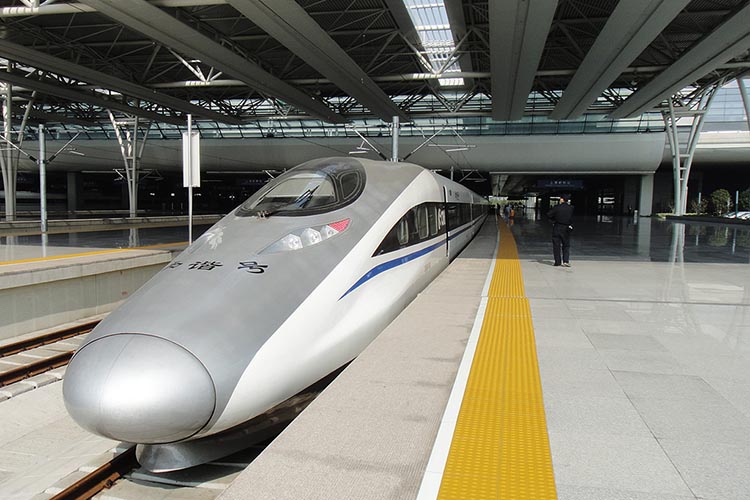You’ll get 3G connection in remote farmland in?Inner Mongolia, though there mightn't be running water. Banks and ATMs are plentiful around the country, but credit cards still aren’t widely accepted. And the truly unlucky may happen in to one of the world's worst toilets just down the street from their swish boutique hotel.

Modern Shanghai. Image by Robert S Donovan / CC BY 2.0
Despite these many paradoxes, China is developing at an enormous rate, with the newest gadgets popping up on every corner. Here are a few tips for getting around in 21st-century China.
Cash is king in China but the relative strength of many foreign currencies against China's RMB?means?you’ll be carrying thick wads of cash. Many hotels and stores in China don't accept overseas credit cards, and withdrawing cash from ATMs with a Cirrus/Plus-enabled ATM card is possible, though hefty fees and poor conversion rates tend to mean you don't get good bang for buck.
It might sound like a hassle at first, but opening a Chinese bank account can be a surprisingly convenient alternative, especially if you plan to travel here for a few weeks. Most visitors land at Beijing or Shanghai airports, where there are several large bank branches with staff who speak some English. Bank of China, Agricultural Bank of China and ICBC are some of the most reliable and the application process shouldn't take more than half an hour.

Bank of China.?Image by EnigmaHuang?/?CC BY-SA 2.0
Ask to open a new account: ‘Wǒ?yào?kāi?zhànghù.’ (我要开账户). Bank staff will help fill out the forms and give you an ATM card straight away. You can then deposit cash into your new account. You’ll need to provide your hotel's contact details as an address to register the account. The ATM card works for withdrawing cash or paying at supermarkets, hotels and shops that accept UnionPay (银联).
Note that small fees apply for cash withdrawals outside the province where the account was opened. ATMs also have English options.
You could also look for a Bank of China branch in your home country to open an account and get an ATM card that is UnionPay-enabled before you travel.
Otherwise, if you plan on making ATM withdrawals on the road, make sure you get an ATM card connected to the Plus or Cirrus networks. To avoid paying monthly interest fees for cash advances, prepay your credit card account with ample cash to cover your travel expenditure. This way, when you take a cash advance at an ATM, you won’t be in the red and incur high interest rates.
Wi-fi access is ubiquitous in China these days. Many cafes and hotels offer internet connections at decent speeds. Bringing a device like a smartphone, tablet or mini-notebook will save you having to hunt for a cigarette smoke-filled internet cafe. An added bonus? You've got Angry Birds and plenty of ebooks to keep you going through an epic Chinese bus or train journey. Don’t forget to download a useful offline Chinese-English dictionary app such as Pleco?(pleco.com).?If you're committed to your keyboard, you could opt to bring a mini-notebook computer like the Ultrabook, or invest in a portable keyboard for your tablet.
Be sure to bring a portable extra battery to keep your device juiced up on the road.?In a pinch, phones and tablets can be recharged via a computer or mini-notebook; be sure to bring a USB-to-LAN adaptor.

Wi-fi is common in China. Image by Cory M Grenier / CC BY-SA 2.0
Instead of incurring roaming data charges or hunting for internet cafes (where foreigners aren’t always accepted), buy a SIM or data SIM card at the airport when you arrive.
Make sure your device is unlocked to any network (you'll need to contact your mobile provider at home beforehand). China Unicom’s network works for most phones and you’ll find a booth at the luggage collection area in Beijing and Shanghai airports. Staff here speak English and are able to get your device set up on-the-spot. At the time of writing, you can sign up for a 66 RMB (roughly 11 USD) no-contract plan that gives you 300mb of data, 50 minutes of China calls, ?and 240 free local SMS per month.
If you don’t need to make calls, there are data-only plans such as a 6GB plan for roughly 96 USD. The card lasts a year. There are lesser plans for those who don’t require 6GB of data.
If you have travelling companions, a 3G hotspot modem can be a handy thing to bring for sharing a connection among a group. Smartphones can also be transformed into a portable hotspots on the go if you've purchased a local SIM card. A portable wi-fi router can also be handy, as not all hotels have wi-fi connections, though most do offer internet access via a LAN cable. A portable wi-fi router like the tiny Asus WL-330NUL transforms a LAN connection into a wi-fi signal. This is especially useful if you’re not packing a laptop or if you want to share a connection with others.
Just as you’re nodding off on a long overland journey, the overhead speaker comes alive, blaring the soundtrack of the Chinese movie, drama or variety show being screened in the bus. Ear plugs can be surprisingly hard to find in China, but they're invaluable. Good canal earphones are also a must for drowning out the snorer in the dorm… There always seems to be one!
There’s a certain romance about train journeys, but when your precious holiday time is of the essence, speedy transport frees up more time for sightseeing and chowing down on delicious local grub.

Bullet train. Image by Sean Savage?/?CC BY-SA 2.0
While a large portion of the country is still connected by old-school, slower trains (K-class), you’ll find that the high-speed D- and G-class (bullet) trains are a great way to travel. They’re fast (reaching speeds of 200 to 300 km/h), clean and comfortable. Most major destinations and cities are connected to Beijing and Shanghai via high-speed rail. Websites like China Train Guide allow you to check train departures and prices in English.
If you're a social media addict or blogger, you might want to set up a virtual private network (VPN) service prior to your trip. Why? The Chinese government has set up a firewall that blocks access to a lot of websites, social media and blogs.